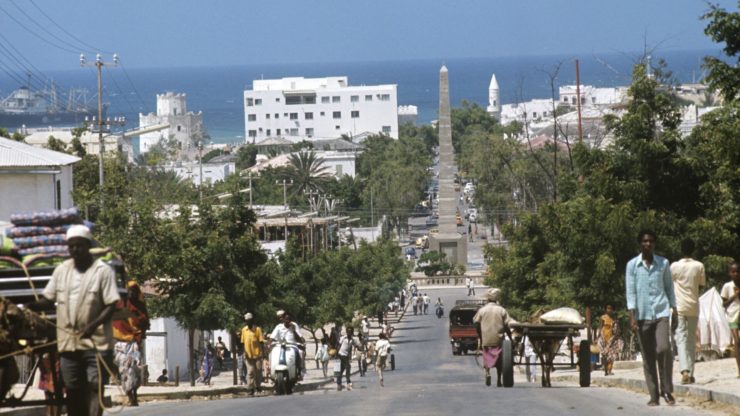
Amidst the world’s focus on the Israel-Hamas war, tensions between Ethiopia and Somalia are simmering. Escalating tensions between the two countries have added to the political instability of the region. Recently, the two countries locked horns over the claims of Somalia, at the African Union summit in Addis Ababa – the capital of Ethiopia, that the Ethiopian administration attempted to refrain President Hassan Sheikh Mohamud from entering the venue. The Somalian President held that an armed soldier denied him access to the summit when he was entering the venue for the second time with President Ismail Omer Guelleh of Djibouti. The Somalian government termed this act outrageous and provocative, while demanding an in-depth AU investigation.
However, the Ethiopian government has rejected these claims while insisting that the Somalian President was given a warm reception. They also added that the Somalian delegation was only blocked from accessing the venue when its security personnel tried to enter the summit with it. Nonetheless, this is not the first instance of conflict between the two sides. Somalia and Ethiopia share some other solemn disputes. The most significant issue between the two countries emerged when the latter signed a controversial memorandum of understanding (MOU) with Somaliland – a breakaway region of Somalia, in January 2024. In 1991, after a destructive and violent civil war, the authoritarian regime of the then President of Somalia, Said Barre was overthrown. Somaliland declared its independence from Somalia following this event. However, the former still struggles to gain international recognition as an independent country.
The recent MoU between Somaliland and the landlocked Ethiopia granted the latter access to the Red Sea. Ethiopia gained access to 12 miles of Somaliland’s coastline for the next 50 years on lease, according to this MoU. Ethiopia will use the Port of Berbera for military and commercial purposes. In return, Somaliland will gain an undisclosed percentage of stake in the Ethiopian Airlines. Somaliland’s President Muse Bihi Abdi also held that Ethiopia will also recognize Somaliland as an independent country. However, this claim has been refuted by Ethiopia. The latter holds that the MoU is being misinterpreted by the Somaliland president, as it only binds Ethiopia to undertake an “in-depth assessment towards taking a position on the efforts of Somaliland to gain recognition.”
Nevertheless, the MoU has infuriated Mogadishu. The Somalian government has declared the MoU tantamount to a declaration of war, regardless of its details. Somalia has also ordered its military to prepare for the defense of the country. However, it has also offered a negotiation process to Ethiopia, led by Somalia, if it seeks to gain access to a port along the Red Sea. On the other hand, the incumbent Prime Minister of Ethiopia, Abiy Ahmed, is known for his confrontational and unchecked policies. The Ethiopian forces have been accused of committing serious human rights violations, including ethnic cleansing, under his rule by Amnesty International. The gravity of the situation could be gauged by the previous statements made by Abiy in which he described the landlocked status of the country to be an existential threat. He also vowed to gain access to a seaport through any means, either by force or through negotiations.
The MoU between Somaliland and Ethiopia has been rejected by different international organizations, including the African Union, the Arab League, and the United Nations. They have also reaffirmed their support for the territorial integrity and sovereignty of Somalia. Ethiopia is receiving a serious backlash from many regional and international organizations and countries. However, amongst all this, serious questions have been raised on the effectiveness and credibility of the African Union (AU). The organization has called for immediate negotiations between Ethiopia and Somalia. However, the AU did not directly refer to the MoU signed between Somaliland and Ethiopia while calling for respect for the sovereignty of the regional countries. This is a faux pas on the part of the AU and has daunted the credibility of the organization even more.
In the recent AU summit, the Commission Chief Moussa Faki Mehmet criticized the African leaders for being unable to counter numerous non-democratic and unconstitutional overthrow of governments in Africa. The region has witnessed 7 coups in the last three years. The regional countries being ruled by non-democratic and unconstitutional governments, including Niger, Burkina Faso, Gabon, Guinea, Mali, and Sudan – were excluded from the summit. The Commission Chief also raised concerns for other countries of the region. However, the ineffectiveness of the African Union and the inability of local government is resulting in accentuating instability and chaos in the region. The threat of Al-Shabaab is growing in Somalia is growing. The Sahel region in Africa accounts for 43 percent of global deaths resulting from terrorism. The Democratic Republic of Congo, Libya, and Sudan are also facing internal chaos and instability. The threat of war between Ethiopia and Eritrea is also imminent in the region. Poverty, terrorism, climate change, and political instability are some of the major issues that the region faces. Amongst all these issues, simmering tensions between Ethiopia and Somalia need immediate attention by regional and international organizations. The Ethiopian Prime Minister must be forced to abide by international rules and norms. Otherwise, a humanitarian crisis like Gaza could engulf the region.
Abbas Hashemite – is a political observer and research analyst for regional and global geopolitical issues. He is currently working as an independent researcher and journalist, exclusively for “New Eastern Outlook”.